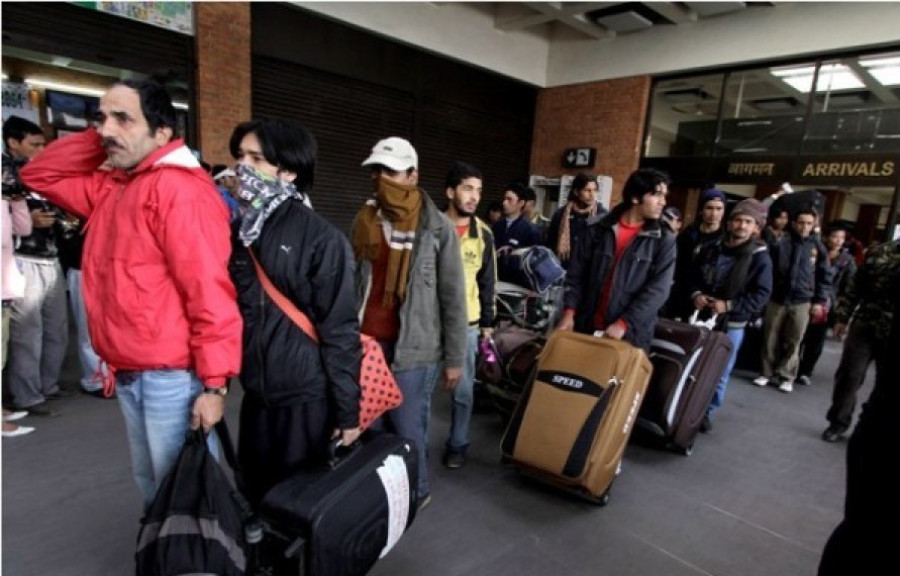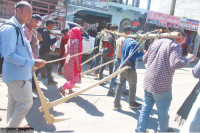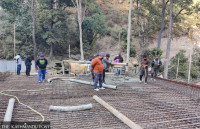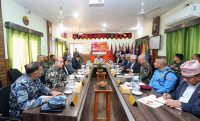National
Set up a mechanism for ensuring migrant workers wages, labour rights activists say
A large number of workers have returned home unpaid with no guarantee of being paid.
Chandan Kumar Mandal
As a large number of migrant workers have become victims of wage theft in the wake of the Covid-19 pandemic, migrant rights activists and trade union representatives have demanded the setting up of transitional justice mechanisms to ensure workers are paid.
After Covid-19 rendered tens of thousands of Nepali migrant workers jobless, leaving them with no option but to return home, a majority of them had to suffer wage theft—denial of their hard-earned wages.
“We need a mechanism in place to ensure that workers’ wages are paid before they head back home,” said Laxman Basnet, general secretary of the South Asian Regional Trade Union Council. “Their dues should be cleared in the country of destination. If they are not paid before their departure, a grievance recording and hearing mechanism should exist at the local level too.”
According to worker rights activists, these workers have faced problems like ill-treatment, fear of infection and being stranded in foreign countries as they go unpaid when they board flights back home.
Being unpaid is one of the biggest issues faced by migrant workers. “Even before Covid-19, this was the biggest challenge. Workers were either not paid fully or not paid at all. The problem has grown exponentially with the pandemic,” said William Gois, a regional coordinator for the Migrant Forum in Asia, a regional network of migrants’ organisations. “They are abandoned by their countries of origin or destinations where they work. It’s not about telling them that they have not done anything but what they have done in ensuring their rights are not adequate.”
Labour rights activists have demanded the establishment of transitional justice mechanisms, such as an International Claims Commission which will address the issues of wage theft which has arisen after the pandemic.
“Many workers will be coming back without wages. The system in the country of origin was not responding to the volume of cases of wage theft earlier,” said Gois. “We have to recognise that there is a problem and we have to call for the reform of the justice system.”
Nepali workers, who have been returning home after the government decided to bring them back in a repatriation drive, have also returned without their salaries. A directive which was introduced to repatriate stranded workers at the government’s expense has addressed some issues of wage theft but some issues still remain, according to rights activists.
“The directive has at least addressed the issue of data collection on migrant workers not being paid. There should be a fast track clearance mechanism so that they could be paid earlier,” said Shom Luitel, a lawyer who was also a member of the directive formulation team. “The two application forms attached in the directive note whether these workers were paid. This data can be utilised for providing them with their unpaid salaries. However, the first option should be handling their due wages in the destination country itself.”
Gois suggested that unpaid workers should be paid by the government of the labour destination in advance so that these workers would not have to return home penniless and then wait for their salaries.
“The host nation can always claim it back from the employer. Sometimes, some philanthropist organisations can also pay workers if the companies have financially collapsed,” said Gois. “Employers will ultimately rise back when the situation becomes normal or with the government injection provided to cope up with the hard time, but the workers may not as they are being repatriated.”
Both the labour destination and origin countries should be made accountable for clearing the dues of the migrant workers who have often invested a hefty amount for their overseas jobs. According to labour rights activists, Nepali missions should start registering workers’ grievances if they were not paid their wages and other perks before they are repatriated or when they land at the airport or stay in quarantine.
“Dues clearance is not only for migrant workers, but a country like Nepal, which is dependent on the remittance sent by workers, also needs to calculate the loss of remittance if these workers are not paid,” said Gois. “This is not the money given as support by any country but the hard-earned money of poor migrant workers.”




 10.15°C Kathmandu
10.15°C Kathmandu













